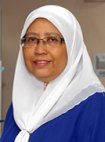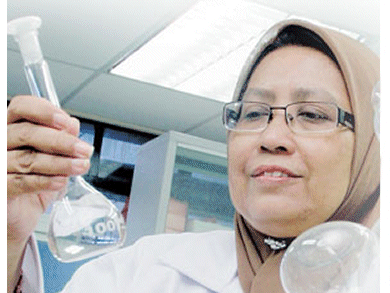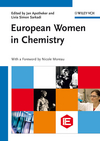2011 is the International Year of Chemistry (IYC 2011) and the centenary of Marie Curie’s Nobel prize in Chemistry. Therefore, ChemViews will introduce interesting women throughout the year.
Zuriati Zakaria is a professor at the Universiti Kebangsaan Malaysia (UKM), Selangor, Malaysia, and the first Malay woman from Malaysia to receive a PhD in chemistry.
Please tell us a bit about how your career has developed?
I was in the first batch of 25 science students who graduated from Universiti Kebangsaan Malaysia (UKM), a University set up in 1970 with the Malay language as the official language. Before that, there was only the University of Malaya which has stringent entry qualifications, leaving little opportunity for students who were weak in English.
I was a suburban child with an illiterate mother and a strict father; I managed to pass A-levels in science to gain entry to UKM. Lecturers from Indonesia and the US Peace Corps, with a crash course in the Malay language, were assigned to conduct the courses at the Faculty of Science, UKM. I was the only girl in the class of five taking chemistry.
After passing the final exams, I was recruited as a tutor for the university and was sent to Mahidol University, Thailand, as the Master’s degree at Mahidol is well recognised and would guarantee a place at a UK University for a PhD programme. It was a difficult two years managing with a foreign language and culture as well as catching up with one year of organic chemistry since I only went through 3 years of undergraduate studies compared to Thai students who had undergone 4 years of study.
Due to a very good, young, and enthusiastic supervisor, Dr. Yodhathai Thebtaranonth I survived and was on the way to the University of East Anglia, UK, to work with Professor Dr. Alan Katritzky for my PhD degree.
I completed my studies in three years and returned to Malaysia to take up the post of lecturer in 1978. I was informed that I was the first Malay woman to obtain a PhD, although there have been many Chinese Malaysian women before me. Since then, my career has developed from lecturer to associate professor and in 2002, I was promoted to Professor.
How was coming back to Malaysia for you?
The laboratories at my university lacked in equipment and I could not continue working as a synthetic chemist. I had to diversify my research to natural products and environmental chemistry due to limitations in budget and facilities. We published papers in local journals and set up societies in order to establish networking for analytical services. I also got involved in Government projects such as Environmental Impact Assessment and the Stockholm Convention. I also went on scientist exchange programmes to get experience doing research in Korea, Australia and Denmark.
It was only in the last ten years that my university purchased equipment that postgraduate students can work with. I was also involved with various scientific associations in the country and internationally and was honoured to be accepted as a Fellow of the Academy of Science in Malaysia in 2009.
What do you enjoy most about your career?
Being an academic is enjoyable — the teaching, the research, travelling to other countries to attend conferences. It gives me satisfaction to know that I can help those who came from the same background as me, especially when I manage to polish diamonds in the rough. I enjoy getting to meet scientists from around the world and exchanging ideas, concepts and new developments in chemistry, which provide a more complete picture of the current trends in chemistry research.
When did your interest in sciences begin?/How did you decide to become a chemist?
The way that the educational system worked in my time was that students with better grades at school were automatically streamed into science classes. It was a very rigid system where lessons did not peak much interest. I will admit that chemistry was not my first love, but I made it my major in my third year of UKM as a challenge to myself.
All in all, my involvement in chemistry was a force of circumstances but now I cannot picture myself anywhere else.
What has been your biggest influence/motivation?
I would say that the time spent studying in Thailand was my big influence. My supervisor was so passionate about chemistry. He was very smart. He came from a rich family, but he would work very late to concentrate on his research. All my classmates at Mahidol University were very committed and there was a good working environment where we would solve problems together and help each other. In organic chemistry, there was a lot of chromatography work and there were times that we had to spend the night at the labs to finish the work. After leaving Thailand, I felt I had learned a lot and I was more selfconfident.
I was further motivated when I was a student at the University of East Anglia, UK. I was star-struck, meeting renowned chemists who delivered talks at the invitation of Professor Alan Katritzky. Prof. Katritzky also has a strong love for heterocyclic chemistry and he was a real workaholic. He was my role model.
Do you think there are still differences between men and women in chemistry?
There are no differences between men and women if they are given equal opportunity in pursuing education. In earlier days, not many girls chose chemistry as they perceived that biology was the subject for them. The current situation is that, in the chemistry class that I teach, more than 60 % of the students are female. It depends on the culture and the support that a woman gets in order to succeed in her career. In industry, women face more challenges in getting management level positions.
Have you experienced any personal struggles typical for women in sciences? And what advice would you give other women thinking of embarking on a scientific career?
Most women with families would experience some problems when you need to be away from your children to do sampling in a jungle or along a river, for example. I also need to go away for collaborations with various labs and also to attend conferences and seminars. I am not very interested in administrative posts and so if I am not given a position, I am fine with it. I just take the challenges as they come. I was surprised when I was nominated as the Hon. Secretary of Institut Kimia Malaysia. Several years later, I was asked to be the Sec. General of Federation of Asian Chemical Societies; the first woman to hold this post.
I think it is about taking up challenges. We need to face them and try hard.
How did you combine family and job?
I am extremely lucky that I have strong support at home. I have three children, my husband is also successful in his career. Initially my mother lived with me and took care of my children while I was at work. I also had a faithful Indonesian maid who would take care of everything in the house. I only had to do the shopping and look after my children’s schoolwork.
What do you do in your spare time?/What are your other interests?
Spare time is spent as quality time with the family — visiting relatives, eating out and shopping. Occasionally I cook, as a chemist is expected to do. As children nowadays are more exposed to western food, which my maid is not familiar with, I will whip up a trifle or make spaghetti or bake macaroni. We also have fun making cookies during the month of Ramadan to have them ready for the celebration on the first day of Shawal.
I enjoy getting involved in NGOs. I am a member of the Malaysian Science Association, Malaysian Oil Scientists’ and Technologist Association, Malaysian Professional Centre, Women’s Organisation of UKM, and National Council of Senior Citizens of Malaysia. Being involved with these organisations makes me open up my mind and I get to be involved in scientific activities and community.
What would you like to be doing ten years from now?
I shall be retiring then, but I shall still be involved in some community activities. In the East, the elderly wish to be with their grandchildren. I look forward to that, but I hope to be able to still travel and participate in scientific activities.
What else would you like readers of ChemViews to know about you, your experiences, or women in sciences in your country or in general?
I would like to say that I was not a bright child and that I am a late developer. The way I was raised is authoritarian and due to that, I find that I have a weakness in expressing my thoughts and public speaking. So, I try to raise my children differently so that they can voice their opinion better.
I am happy that in my country women are given equal opportunities in science education. I am also proud to say that even in the Ministry of Science and Innovation in Malaysia, there are about four women in the top management who are the decision makers.
The Vice Chancellor of Universiti Kebangsaan Malaysia, where I work, is the first woman VC. Tan Sri Dato’ Wira Dr. Sharifah Hapsah Syed Shahabudin is from the medical sciences.
Thank you very much for this interview.
 Professor Zuriati Zakaria (MSc, PhD, FMIC, F.A.Sc. PMP), School of Chemical Sciences and Food Technology, Faculty of Science and Technology, Universiti Kebangsaan Malaysia, is working in the field of organic and environmental chemistry.
Professor Zuriati Zakaria (MSc, PhD, FMIC, F.A.Sc. PMP), School of Chemical Sciences and Food Technology, Faculty of Science and Technology, Universiti Kebangsaan Malaysia, is working in the field of organic and environmental chemistry.
She received her PhD in heterocyclic chemistry at the University of East Anglia, UK, in 1978 after having studied at the Academic SmSn(Kimia) Universiti Kebangsaan Malaysia, Kuala Lumpur, Malaysia, and receiving her MSc in organic chemistry from the Mahidol University, Bangkok, Thailand.
She was Editor-in-Chief of Sains Malaysiana between 2002–2008, and Editorial Board member of the Journal of Palm Oil Research from 2000–2008.
Amongst others Professor Zakaria belongs to the Bioorganic Committee of the IUPAC since 2009. She was Secretary-General of the Federation of Asian Chemical Societies from 2007–2009 and is Council Member of the Malaysian Institute of Chemistry (Institut Kimia Malaysia) since 2000.
More information
Zuriati Zakaria, Universiti Kebangsaan Malaysia (UKM), Malaysia
Selected Publications
- Extraction of Melalueuca cajuputi using supercritical fluid extraction and solvent extraction,
S. M. Jajaei, W. R. W. Daud, M. Markhom, Z. Zakaria, M. Lo Presti, R. Costa, L. Mondello,
J. Essent. Oil. Res. 2010, 22, 205–210. - Chemical Profile Of Compounds From Lichens Of Bukit Larut, Peninsula Malaysia,
Laily B. Din, Z. Zakaria, M. Wahid Samsudin, John A. Elix,
Sains Malaysiana 2010, 39(6), 901–908 - Bioactivity Investigation of Litsea globularia in Bornea,
K. Heng Yen, Z. Zakaria, N.Hadiani Ismail, Z. Md Nor, R. Ahmad, L. b Din,
Malaysian J. Sci. 2009, 28: (Special Edition), 223–228. - Chemical Constitutents from the Fruit Peel of Goniothalamus scortechinii,
A. Abdullah, Z. Zakaria, F. b Ahmad, K. Mat Salleh, L. Bin Din,
Sains Malaysiana 2009, 38(3), 365–369. - Synthesis of Palmitic Acid-based esters and their effect on the pour point of palm oil methyl esters,
C. Han Sern, C. Yuen May , Z. Zakaria, R. Daik,
J. Oil Palm Res. 2008, 20, 517–522.
► see all Women in Chemistry Interviews
European Women in Chemistry
Published: 11 November 2010
ISBN: 978-3-527-32956-4
Author: Jan Apotheker, Livia Simon Sarkadi





